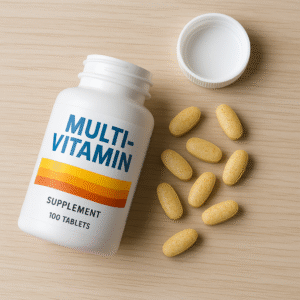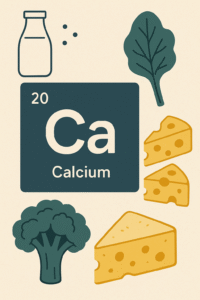This post may contain affiliate links. If you purchase through these links, I may earn a small commission at no extra cost to you.
Walk through the health and wellness aisle of any grocery store and you’ll see “probiotics” on everything from yogurt to supplements, drinks, protein bars, and even skincare. Are they really as good as the hype? If you’ve ever had digestive problems, felt run down, or just wanted to support your whole-body wellness naturally, might be the missing link you’re looking for. This guide breaks down everything you need to know about probiotics: what they are, how they work, the best ways to get them, and who stands to benefit most.
What Are Probiotics, and Why Do They Matter?
Probiotics are live microorganisms—usually bacteria or yeast—that deliver health benefits when consumed in adequate amounts. The word “probiotic” literally means “for life.” Unlike harmful bacteria that can make you sick, probiotics are “friendly” bacteria. They help keep your body—especially your gut—balanced and healthy.
Your Gut: Home to Your Microbiome
Inside your intestines is a complex ecosystem called the microbiome—trillions of bacteria, viruses, fungi, and other microbes. This “mini universe” is so important that scientists sometimes call it an “invisible organ.”
Your gut microbiome is essential for:
- Digesting food and absorbing nutrients
- Making vitamins (like K, B12, and folate)
- Supporting your immune system
- Preventing harmful bacteria from taking over
- Regulating mood and brain health
A healthy, diverse microbiome is the foundation for good digestion, immunity, metabolism, and even a positive mood.
How Do Probiotics Work?
When you eat or take probiotics, they travel to your gut and help balance your existing bacteria. They do this by:
- Competing with harmful bacteria for space and resources.
- Producing substances (like acids and enzymes) that discourage bad microbes.
- Training your immune system to respond properly (not overreact, which can cause allergies or inflammation).
- Helping make vitamins and short-chain fatty acids that nourish your gut lining.
Probiotics are especially helpful when your microbiome gets out of balance—a state called dysbiosis—which can happen after antibiotics, illness, a poor diet,
Health Benefits of Probiotics: What the Science Says
1. Digestive Health and Comfort
This is where probiotics really shine. The right strains can:
- Ease symptoms of irritable bowel syndrome (IBS), like bloating, gas, constipation, and diarrhea
- Prevent or treat antibiotic-associated diarrhea
- Help with infectious diarrhea (like traveler’s diarrhea)
- Reduce symptoms of inflammatory bowel diseases (Crohn’s, ulcerative colitis) for some people
2. Stronger Immunity
Nearly 70% of your immune system lives in your gut! Probiotics help by:
- Reducing frequency and duration of common colds
- Lowering inflammation and allergy risk
- Supporting recovery from infections
3. Mood, Stress, and the Gut-Brain Connection
There’s a direct line of communication between your gut and your brain, called the gut-brain axis. Probiotics help:
- Reduce symptoms of anxiety and depression in some studies
- Enhance resilience to stress
- Improve focus and mental clarity for certain people
4. Weight, Metabolism, and Blood Sugar
Certain probiotic strains may:
- Support healthy weight management
- Improve blood sugar and insulin sensitivity
- Help regulate appetite hormones
5. Other Potential Benefits
Emerging research suggests probiotics may also:
- Improve skin health (eczema, acne)
- Reduce the risk of urinary tract infections and vaginal infections
- Support oral health
- Help manage allergies and asthma in children
Food Sources of Probiotics
Not all probiotics come from a pill! Many cultures around the world have long included probiotic-rich, fermented foods in their diets.
Top probiotic foods:
- Yogurt (look for “live and active cultures”)
- Kefir (a tangy fermented milk drink)
- Sauerkraut (fermented cabbage, unpasteurized)
- Kimchi (spicy Korean fermented veggies)
- Miso (fermented soybean paste)
- Tempeh (fermented soybeans)
- Kombucha (fermented tea)
- Pickles (naturally fermented in brine)
- Some cheeses (like gouda, cheddar, Swiss with live cultures)
Note: Pasteurization and heat processing destroy live cultures, so look for fresh, raw, or “live” products.
Probiotic Supplements: What to Know
Probiotic supplements can be helpful if:
- You don’t eat fermented foods regularly
- You’ve taken antibiotics
- You have digestive issues or a weakened immune system
- You’re under a lot of stress or travel often
How to Choose a Probiotic Supplement:
- Strain-Specific Benefits
Not all probiotics are the same! Each strain does something different.
- Lactobacillus rhamnosus GG – best for diarrhea and immunity
- Bifidobacterium lactis – great for digestion and regularity
- Saccharomyces boulardii – a yeast helpful for antibiotic-associated diarrhea
- CFU Count
CFU stands for “colony-forming units,” a measure of live bacteria. For most people, 1–10 billion CFUs daily is enough; higher doses may be used for special situations. - Multi-Strain Formulas
Supplements with a mix of different strains can offer broader benefits. - Quality and Storage
Choose reputable brands with third-party testing. Some probiotics need refrigeration; others are shelf-stable. - Expiration Date
Live bacteria lose potency over time. Always check the “best by” date.
Are Probiotics Safe for Everyone?
For most healthy people, probiotics are very safe. Mild side effects like gas or bloating may happen at first.
People who should consult a doctor first:
Infants and elderly people with chronic diseases
Those with severely weakened immune systems (e.g., from chemotherapy or organ transplants)
People with serious illnesses or recent major surgery
The Importance of Prebiotics and Synbiotics
Probiotics are the “seeds,” but prebiotics are the “fertilizer.”
Prebiotics are non-digestible fibers that feed your good gut bacteria.
Great prebiotic foods include:
- Garlic, onions, leeks
- Asparagus
- Bananas (slightly green)
- Oats, barley
- Apples
- Jerusalem artichokes
Synbiotics are supplements or foods combining probiotics and prebiotics for an even bigger boost.
Getting the Most Out of Your Probiotics
- Take consistently: Benefits come from daily use, not occasional.
- Pair with prebiotics: Eat lots of fiber-rich plant foods.
- Avoid excess sugar and processed foods: These can encourage “bad” bacteria.
- Don’t rely on one source: Rotate different strains and foods for a diverse microbiome.
- Consider timing: Some strains are best taken with food; others on an empty stomach—read your supplement label.
Frequently Asked Questions
Do probiotics work right away?
Digestive improvements may be noticed in days, but immune or mood benefits can take weeks or months.
Should I switch up my probiotics?
Diversity is good! Rotate different strains every few months or include more fermented foods.
Can you get too many probiotics?
For most healthy people, excess is simply eliminated by the body. However, always follow label instructions.
Can children take probiotics?
Yes, but choose age-appropriate products and consult a pediatrician, especially for infants or if your child has health issues.
What destroys probiotics?
Heat, antibiotics, and stomach acid can reduce the number of live bacteria reaching your gut. Take with food and store as directed.
The Bottom Line: Are Probiotics Right for You?
Probiotics are one of the simplest, most natural ways to support better digestion, immunity, and whole-body wellness. Whether you get them from delicious fermented foods or a quality supplement, nourishing your microbiome is a smart step for nearly everyone. Pair probiotics with a healthy, fiber-rich diet, manage stress, and get regular exercise for maximum benefit.
As always, listen to your body and consult your healthcare provider—especially if you have underlying conditions or take medications. Start small, stay consistent, and discover how a healthy gut can change your life.
Want more science-backed wellness tips? Subscribe to WellnessDoseHub for honest advice, practical guides, and expert reviews delivered to your inbox!

